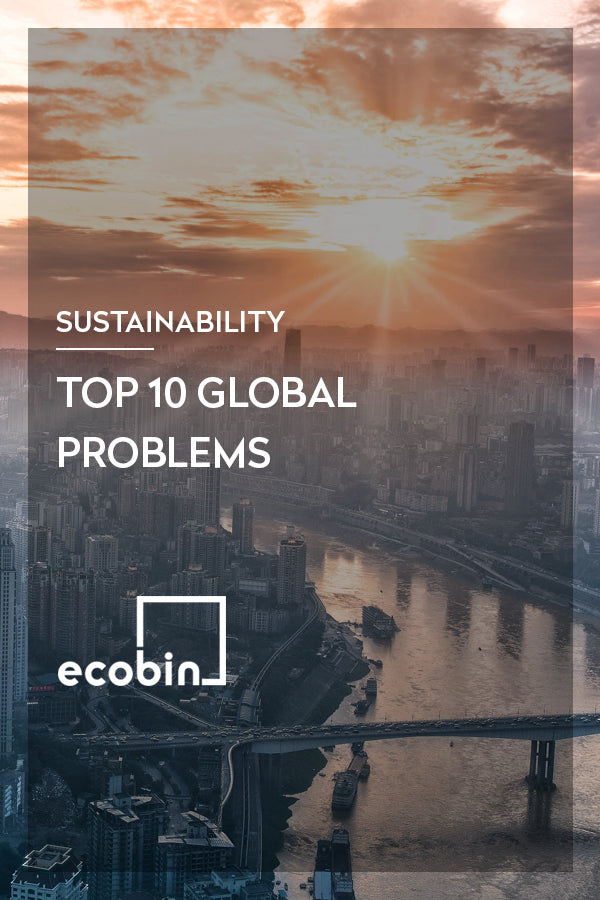
Top 10 Global Environmental Problems
With the help of many surveys and a lot of research, it has been found that more than 50% of people across the globe believe that abrupt climate change is the biggest global concern. It is seriously impacting the health of our planet and is the reason behind so many other problems, for example more droughts, more floods and many other extreme events. The good news is that most people are ready to change their lifestyle to fix it and save the environment.
Apart from climate change, there are other environmental problems as well, and if we’re going to save the planet we better know what we’re up against.So here’s a rundown of the top 10 global environmental issues:
- Climate change - Also known as global warming. The main cause is the release of carbon dioxide into the atmosphere beyond its limit, a greenhouse gas traps the heat coming from the sun in the earth’s atmosphere. The major source of this gas is human activity like burning fuel from transportation and carbon emissions from factories and large scale industry. It has become very important to control these carbon emissions by changing our habits.
- Water Crisis - According to the latest report released by the World Resource Institute (WRI), nearly a quarter of the world's population is facing a severe water crisis. The 17 major countries facing severe water crisis are Qatar, Israel, Lebanon, Iran, Jordan, Libya, Kuwait, Saudi Arabia, Eritrea, UAE, San Marino, Bahrain, India, Pakistan, Turkmenistan, Oman and Botswana respectively. According to WRI, these 17 countries are going through an acute shortage of water and more countries will soon be at risk.
- Pollution - Air pollution, water pollution and landfills, are becoming increasingly critical problems, particularly in densely populated cities. It impacts every aspect of our environment including both humans and animals alike. There are a number of health problems seen due to air and water pollution in urban areas.
- Ozone Layer Depletion - The ozone layer is a layer of gas present in the uppermost part of the atmosphere. It protects the planet by stopping the UV rays that are coming from the sun. These rays are very hazardous and can be responsible for many serious health problems like painful sunburns, pre-ageing of skin, cataract or even skin cancer. These UV rays are also very bad for marine life as it reduces the amount of plankton in the water. The layer is getting depleted due to the release of chemicals like chlorine and bromide. The use of aerosols, fire extinguishers, old refrigerants, conventional cleaning products and other products need to be kicked to the kerb!
- Waste Production - Disposal of waste into landfill can cause leaching of contaminants into soil and water. Eeeeewwwwww! It also leads to the emissions of toxic gases in the environment. Waste management has become a necessity now. Recycling, reducing and reusing of waste can not only help the environment but helps you save your hard earned money. Waste is not only an environmental problem but also an economic loss, so it's better to produce less waste or to convert the waste into resources by recycling or reusing it.
- Deforestation - Deforestation is clearing forests for human development then using the trees to produce wood and paper. However, now it has reached the point where we are getting more adverse effects than benefits. Soil erosion, irregular rains, flooding, increased greenhouse gases are some of the adverse effects this has on our environment.
- Natural Resource Depletion - We have got limited natural resources, and if they’re not used sparingly, there is a chance that we can face the energy crisis soon. The levels for water, fossil fuels, coal, wood and other natural resources are getting lower day by day. The consumption of these sources have become faster than their rate of replenishment. Saving is the only solution left for the sustainability of this planet.
- Loss of Biodiversity - Biodiversity is important because every species on the earth is helpful to keep many ecosystems healthy, thriving and balanced. It plays a vital role in the sustainability of life on the earth. There are many reasons for the loss of biodiversity like deforestation, climate change, overfishing, over harvesting and over hunting. Many species have experienced substantial losses and many are nearing extinction, so awareness is very important to control it.
- Ocean Acidification - When carbon dioxide comes into contact with seawater, it causes them to become more acidic. Due to this, the pH level of the seawater increases affecting the marine life and coral reefs. So controlling the amount of Co2 in our atmosphere will also help our oceans be able to sustain life.
- Overpopulation - Many scientists think that 10 billion people is the uppermost population limit when food is concerned. And if we see the population graph, the numbers and line curve are shocking! In 1990, the world population was 5.3 bn which increased to 6.1 bn in 2000, 7 bn in 2010 and 7.7 bn at present. The graph line indicates the global population to reach 10 bn in 2057, which is alarming. Female empowerment and education will play a critical role in helping many nations tackle the numerous problems caused by climate change
